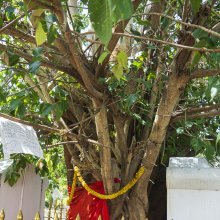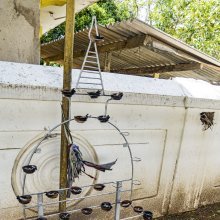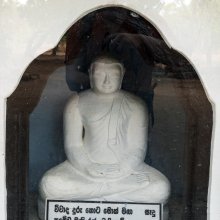Duru: 4 definitions
Introduction:
Duru means something in Hinduism, Sanskrit. If you want to know the exact meaning, history, etymology or English translation of this term then check out the descriptions on this page. Add your comment or reference to a book if you want to contribute to this summary article.
Images (photo gallery)
Languages of India and abroad
Sanskrit dictionary
Source: Cologne Digital Sanskrit Dictionaries: Monier-Williams Sanskrit-English DictionaryDuru (दुरु):—m. Name of a mountain, [Mahābhārata xiii, 7658.]
[Sanskrit to German]
Sanskrit, also spelled संस्कृतम् (saṃskṛtam), is an ancient language of India commonly seen as the grandmother of the Indo-European language family (even English!). Closely allied with Prakrit and Pali, Sanskrit is more exhaustive in both grammar and terms and has the most extensive collection of literature in the world, greatly surpassing its sister-languages Greek and Latin.
Kannada-English dictionary
Source: Alar: Kannada-English corpusDuru (ದುರು):—[noun] (in comp.) anger.
--- OR ---
Duru (ದುರು):—[noun] excessiveness; intensity.
--- OR ---
Dūru (ದೂರು):—
1) [verb] to find fault with; to blame; to reproach; to accuse.
2) [verb] to report evil of another; to utter slander against.
3) [verb] to bring formal charges against (of doing wrong, breaking the law, etc.).
4) [verb] to appeal earnestly for help.
5) [verb] to give an account of; to report; to bring to (another’s) notice.
6) [verb] to say pessimistically that some bad or evil thing would happen; to portend a future evil, failure or unfortunate thing.
--- OR ---
Dūru (ದೂರು):—
1) [verb] to enter or be inserted, into (something); to be in between (esp. in a narrow space).
2) [verb] to thrust out or project; to protrude.
3) [verb] to pass through.
--- OR ---
Dūru (ದೂರು):—
1) [noun] an accusing or being accused; accusation.
2) [noun] very bad reputation; disgrace; dishonour; infamy.
3) [noun] a requesting for help, sympathy, etc.; an appeal.
4) [noun] a message, report or news.
5) [noun] an order; a command.
6) [noun] anxious concern; worry; anxiety.
7) [noun] pain; suffering; distress; anguish.
8) [noun] a vicious report given to another about and in the absence of a third person.
--- OR ---
Dūru (ದೂರು):—[noun] that which is situated at or removed to a distance.
--- OR ---
Dūṟu (ದೂಱು):—
1) [verb] to find fault with; to blame; to reproach; to accuse.
2) [verb] to report evil of another; to utter slander against.
3) [verb] to bring formal charges against (of doing wrong, breaking the law, etc.).
4) [verb] to appeal earnestly for help.
5) [verb] to give an account of; to report; to bring to (another’s) notice.
6) [verb] to say pessimistically that some bad or evil thing would happen; to portend a future evil, failure or unfortunate thing.
--- OR ---
Dūṟu (ದೂಱು):—
1) [noun] an accusing or being accused; accusation.
2) [noun] very bad reputation; disgrace; dishonour; infamy.
3) [noun] a requesting for help, sympathy, etc.; an appeal.
4) [noun] a message, report or news.
5) [noun] an order; a command.
6) [noun] anxious concern; worry; anxiety.
7) [noun] pain; suffering; distress; anguish.
8) [noun] a vicious report given to another about and in the absence of a third person.
Kannada is a Dravidian language (as opposed to the Indo-European language family) mainly spoken in the southwestern region of India.
See also (Relevant definitions)
Starts with (+152): Durubuddhi, Duruccheda, Durucchedya, Duruchchheda, Durudahara, Durudarka, Durudaya, Duruddesha, Duruddhara, Durudgitha, Durudha, Durudhara, Durudhatva, Durudhulla, Durudi, Durudumba, Durudumbe, Durudumbi, Durudumbiga, Durudumbini.
Ends with (+94): Aduru, Adurubaduru, Apaduru, Araturu, Atitturu, Avaturu, Bariduru, Baruduru, Benaduru, Bennebiduru, Biduru, Bongu-veduru, Caduru, Ceduru, Chilkadudduru, Chitteduru, Chittiveduru, Cittiveduru, Damkuduru, Dumduru.
Full-text (+2): Dur, Durum phul, Doron durum phul, Oburu-duru, Durupacara, Durupasthana, Durudvaha, Duruttara, Durupasarpin, Durupakrama, Durudahara, Simhadvara, Desmostachya bipinnata, Daruna, Daru, Turu, Persicaria pensylvanica, Eriogonum corymbosum, Polygonum pensylvanicum, Symphyotrichum lanceolatum.
Relevant text
Search found 1 books and stories containing Duru, Dūru, Dūṟu; (plurals include: Durus, Dūrus, Dūṟus). You can also click to the full overview containing English textual excerpts. Below are direct links for the most relevant articles:


